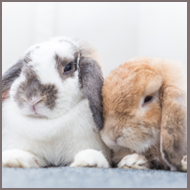
Findings raise concerns about the ethics of breeding popular pet
Rabbits with lopped ears are more likely to have ear and dental problems than rabbits with ears that point straight up, according to new research.
Researchers say the findings, published in Vet Record, raise questions about the ethics of breeding and buying lop-eared rabbits, as they may be more likely to suffer from these conditions.
In the study, researchers examined the teeth and ears of various breeds and ages of 15 lops and 15 erect-eared rabbits from a rescue centre. They also observed their behaviour, looking for signs of pain or discomfort and flinching when being examined.
Their observations confirmed that lops were 43 times more likely to have narrowed ear canals and significantly more likely to have a build-up of ear wax. Lop-eared rabbits were also 15 times more likely to show a pain response during an ear examination.
The team also noted that lops were 23 times more likely to have diseased incisor teeth; 12 times more likely to have overgrown molars; 13 times more likely to have sharp molars; and significantly more likely to have molar-spurs (sharp points on the edge as a result of uneven wear).
An analysis of the rabbits’ health records revealed around half of the lops had dental abnormalities and six needed dental treatment, compared with none of the erect-eared rabbits.
‘The welfare consequences of a rabbit having lop ears include pain, as indicated by statistically significantly increased pain responses during examination of lop ears,’ the researchers write. ‘Additionally, the higher frequency of signs consistent with [outer ear] otitis found in the lop-eared compared with erect-eared rabbits, suggest potential for pain [impaired hearing], or even deafness.’
Commenting on the findings, BVA president Daniella Dos Santos, said: “As well as being likely to suffer from ear and dental problems, lop-eared rabbits are also at increased risk of injury and prone to obesity, as for some, the length of their ears can restrict their movement. Sadly, vets tell us that all too often they’re seeing clients who have chosen a pet with certain features without being aware of the serious health and welfare problems they may have as a result.
“It’s critical that prospective owners think ‘health over looks’ when choosing a pet, as extreme features may come hand in hand with hereditary problems that can lead to serious health problems and be distressing and costly to treat. Vets are happy to give advice on how to find a happy, healthy pet and keep them that way.”



 The Veterinary Medicines Directorate (VMD) is inviting applications from veterinary students to attend a one-week extramural studies (EMS) placement in July 2026.
The Veterinary Medicines Directorate (VMD) is inviting applications from veterinary students to attend a one-week extramural studies (EMS) placement in July 2026.